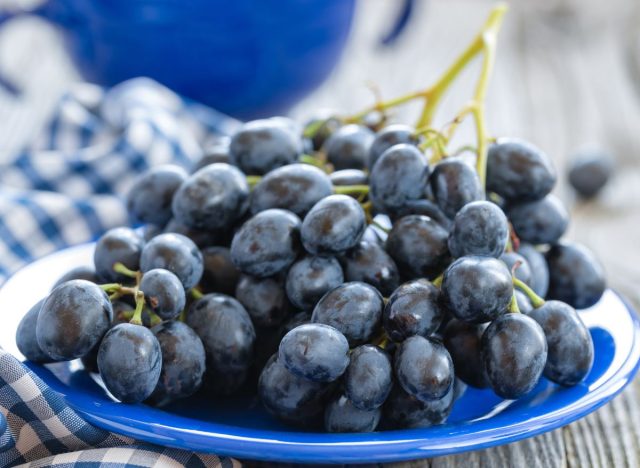
The quest for long-term weight loss starts at the grocery store—or, more specifically, in the produce aisle. But beyond eating a well-balanced diet, exercising regularly, and avoiding excessive calorie intake, your food choices can make or break your success in reaching your weight loss goals. For example, choosing delicious and nutritious fruits like grapes may help you lose weight. That's why we chatted with Destini Moody, RDN, CSSD, LD, a registered dietitian and sports dietitian with Garage Gym Reviews, who explores whether or not eating grapes can help you lose weight.
Read on to find out whether grapes are suitable for your weight loss journey. Then, when you're done, check out the 10 Best Breakfast Foods for Losing Weight and Gaining Muscle.
Can eating grapes help you lose weight?

Grapes are low in calories but pack a punch of natural sugars that deliver a satisfying sweetness without going overboard on calories. Just one cup of red or green grapes provides roughly 100 calories. They're also rich in fiber, an essential nutrient that aids digestion and helps you feel fuller longer, curbing cravings for less healthy snack choices. This combination of low-calorie density and fiber makes grapes an excellent choice for those aiming to shed pounds. Plus, research suggests grapes' antioxidant content can help reduce your risk of heart disease and high blood pressure. However, the best approach to sustainable weight loss is always maintaining a balanced diet that keeps your calories in check paired with a consistent exercise routine.
Here are four ways grapes can help you lose weight.

Now that we've determined grapes can help you shed unwanted weight, Moody offers four ways celery can help you lose weight.
1. They have a high water content.
Staying well-hydrated is essential for optimal health. Hydration can also support weight loss by promoting a feeling of fullness. That's why munching on juicy grapes is a flavorful treat and a hydrating snack that can help you stay on track with your weight loss goals.
Moody explains, "Grapes are about 82% water, which makes them a very filling fruit to snack on. The stomach recognizes how much volume it contains to determine fullness. So, it's a good idea to fill it up with a healthy, water-based fruit or vegetable that's low in calories if you're trying to reduce your calorie intake."
RELATED: 10 Best Frozen Foods To Buy at Whole Foods for Weight Loss
2. They're low in calories.
Grapes are a caloric lightweight, making them a guilt-free addition to your weight loss menu. Plus, their natural sweetness satisfies cravings without significantly affecting your overall calorie intake.
"Speaking of reducing calorie intake, grapes fit nicely into a low-calorie diet," says Moody. "Their low-calorie content means you can enjoy grapes as a side to your breakfast or that sandwich for lunch to add more bulk to your meals while still meeting your calorie goal."
3. They're an excellent substitute for sugary snacks.
According to a 2022 review, fructose and pectin, the natural sugars in grapes, provide a sweet fix without the drawbacks of added sugars found in many snacks. Choosing grapes over sugary treats is a simple swap that can contribute to better snack choices and, ultimately, healthier weight management.
"Although one cup of grapes contains about 15 grams of sugar, it's not the same type of sugar you'll find in a cup of ice cream," Moody explains. "This natural sugar doesn't cause the harmful inflammation that refined sugar causes, and it brings along with it vitamins, minerals, and fiber—all while satisfying your sweet tooth. Try throwing your grapes in the freezer for a late-night frozen treat."
4. They contain antioxidants that help burn fat.
Grapes boast a spectrum of antioxidants, including resveratrol, which is known for potential fat-burning benefits. While more research is needed to understand these effects fully, the presence of antioxidants contributes to grapes' overall health benefits.
"Grapes contain an antioxidant called resveratrol, which studies have shown can improve weight loss outcomes in some of those who have obesity," says Moody. "Additionally, these antioxidants have the ability to fight against harmful free radicals that are responsible for chronic disease, especially heart disease."
- Source: Grape bioactive molecules, and the potential health benefits in reducing the risk of heart diseases
- Source: Resveratrol, in its natural combination in whole grape, for health promotion and disease management
- Source: Resveratrol for Weight Loss in Obesity: An Assessment of Randomized Control Trial Designs in ClinicalTrials.gov









